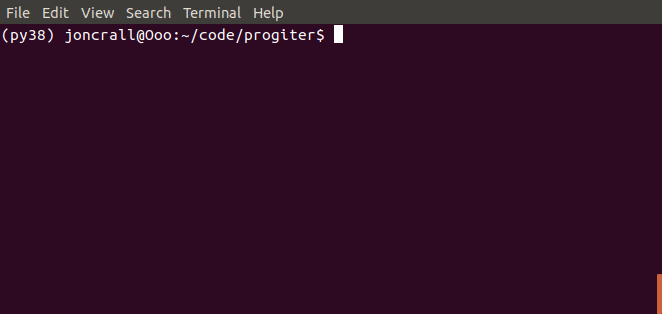A single-threaded alternative to tqdm.
Project description
ProgIter
ProgIter lets you measure and print the progress of an iterative process. This can be done either via an iterable interface or using the manual API. Using the iterable interface is most common.

ProgIter was originally developed independently of tqdm, but the newer versions of this library have been designed to be compatible with tqdm-API. ProgIter is now a (mostly) drop-in alternative to tqdm. The tqdm library may be more appropriate in some cases. The main advantage of ``ProgIter`` is that it does not use any python threading, and therefore can be safer with code that makes heavy use of multiprocessing. The reason for this is that threading before forking may cause locks to be duplicated across processes, which may lead to deadlocks.
ProgIter is simpler than tqdm, which may be desirable for some applications. However, this also means ProgIter is not as extensible as tqdm. If you want a pretty bar or need something fancy, use tqdm; if you want useful information about your iteration by default, use progiter.
Package level documentation can be found at: https://progiter.readthedocs.io/en/latest/
Example
The basic usage of ProgIter is simple and intuitive. Just wrap a python iterable. The following example wraps a range iterable and prints reported progress to stdout as the iterable is consumed. The ProgIter object accepts various keyword arguments to modify the details of how progress is measured and reported. See API documentation of the ProgIter class here: https://progiter.readthedocs.io/en/latest/progiter.progiter.html#progiter.progiter.ProgIter
Note that by default ProgIter reports information about iteration-rate, fraction-complete, estimated time remaining, time taken so far, and the current wall time.
>>> from progiter import ProgIter
>>> def is_prime(n):
... return n >= 2 and not any(n % i == 0 for i in range(2, n))
>>> for n in ProgIter(range(1000), verbose=2):
>>> # do some work
>>> is_prime(n)
0/1000... rate=0 Hz, eta=?, total=0:00:00, wall=12:47 EST
1/1000... rate=58551.44 Hz, eta=0:00:00, total=0:00:00, wall=12:47 EST
257/1000... rate=317349.77 Hz, eta=0:00:00, total=0:00:00, wall=12:47 EST
642/1000... rate=191396.29 Hz, eta=0:00:00, total=0:00:00, wall=12:47 EST
1000/1000... rate=139756.95 Hz, eta=0:00:00, total=0:00:00, wall=12:47 ESTFor more complex applications is may sometimes be desireable to manually use the ProgIter API. This is done as follows:
>>> from progiter import ProgIter
>>> n = 3
>>> prog = ProgIter(desc='manual', total=n, verbose=3)
>>> prog.begin() # Manually begin progress iteration
>>> for _ in range(n):
... prog.step(inc=1) # specify the number of steps to increment
>>> prog.end() # Manually end progress iteration
manual 0/3... rate=0 Hz, eta=?, total=0:00:00, wall=12:46 EST
manual 1/3... rate=12036.01 Hz, eta=0:00:00, total=0:00:00, wall=12:46 EST
manual 2/3... rate=16510.10 Hz, eta=0:00:00, total=0:00:00, wall=12:46 EST
manual 3/3... rate=20067.43 Hz, eta=0:00:00, total=0:00:00, wall=12:46 ESTWhen working with ProgIter in either iterable or manual mode you can use the prog.ensure_newline method to guarantee that the next call you make to stdout will start on a new line. You can also use the prog.set_extra method to update a dynamic “extra” message that is shown in the formatted output. The following example demonstrates this.
>>> from progiter import ProgIter
>>> def is_prime(n):
... return n >= 2 and not any(n % i == 0 for i in range(2, n))
>>> _iter = range(1000)
>>> prog = ProgIter(_iter, desc='check primes', verbose=2)
>>> for n in prog:
>>> if n == 97:
>>> print('!!! Special print at n=97 !!!')
>>> if is_prime(n):
>>> prog.set_extra('Biggest prime so far: {}'.format(n))
>>> prog.ensure_newline()
check primes 0/1000... rate=0 Hz, eta=?, total=0:00:00, wall=12:55 EST
check primes 1/1000... rate=98376.78 Hz, eta=0:00:00, total=0:00:00, wall=12:55 EST
!!! Special print at n=97 !!!
check primes 257/1000...Biggest prime so far: 251 rate=308037.13 Hz, eta=0:00:00, total=0:00:00, wall=12:55 EST
check primes 642/1000...Biggest prime so far: 641 rate=185166.01 Hz, eta=0:00:00, total=0:00:00, wall=12:55 EST
check primes 1000/1000...Biggest prime so far: 997 rate=120063.72 Hz, eta=0:00:00, total=0:00:00, wall=12:55 ESTInstallation
ProgIter can be easily installed via pip.
pip install progiterAlternatively, the ubelt library ships with its own version of ProgIter. Note that the ubelt version of progiter is distinct (i.e. ubelt actually contains a copy of this library), but the two libraries are generally kept in sync.
Project details
Release history Release notifications | RSS feed
Download files
Download the file for your platform. If you're not sure which to choose, learn more about installing packages.
Source Distribution
Built Distribution
File details
Details for the file progiter-1.0.1.tar.gz.
File metadata
- Download URL: progiter-1.0.1.tar.gz
- Upload date:
- Size: 17.1 kB
- Tags: Source
- Uploaded using Trusted Publishing? No
- Uploaded via: twine/4.0.1 CPython/3.8.10
File hashes
| Algorithm | Hash digest | |
|---|---|---|
| SHA256 | 4da1f26c8a2e993545856d801ee2e50efa25f099d011c5eeb347a9e75867ba0a |
|
| MD5 | 56714db6f08dbe2677e6ecbb1bad187c |
|
| BLAKE2b-256 | 42c2910df666c74a1eea3bcd4089889846d75ed8f4a8eae0e279956fe5dcfc30 |
File details
Details for the file progiter-1.0.1-py3-none-any.whl.
File metadata
- Download URL: progiter-1.0.1-py3-none-any.whl
- Upload date:
- Size: 17.9 kB
- Tags: Python 3
- Uploaded using Trusted Publishing? No
- Uploaded via: twine/4.0.1 CPython/3.8.10
File hashes
| Algorithm | Hash digest | |
|---|---|---|
| SHA256 | af9fda3381ac135ebe58d77fcad9ac21faf51bd1adecb55c0bcb303f0c0976df |
|
| MD5 | 974d0fe633ae1114e192f2a09d9b9c84 |
|
| BLAKE2b-256 | e1e8463b63832ff8f09548060adee1bf2dbef4111c1cbdf266da389e38c71d0c |
















